|
|
|
Sort Order |
|
|
|
Items / Page
|
|
|
|
|
|
|
| Srl | Item |
| 1 |
ID:
164419
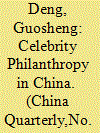

|
|
|
|
|
| Summary/Abstract |
This article provides the first comprehensive analysis of the development of, and public responses to, celebrity-fronted philanthropy in the People's Republic of China. It explores the extent and nature of celebrity philanthropy with reference to a sample of mainland Chinese celebrities in entertainment and sports. It then draws on interviews conducted with employees of large charities to examine the kinds of links that are being forged between China's not-for-profit sector and commercial organizations managing the work of celebrities. Finally, it analyses the responses to a national survey on celebrity and philanthropy. We conclude that the relationship between China's government, not-for-profit and celebrity sectors is becoming more professionalized and organized. This development reveals how the roles and capacities of government are being reconfigured and expanded, even as it also enhances the scope for action and the influence of new social actors and organizations to address government-led national development issues.
|
|
|
|
|
|
|
|
|
|
|
|
|
|
|
|
| 2 |
ID:
164418
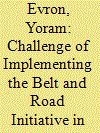

|
|
|
|
|
| Summary/Abstract |
Sceptics query China's economic and political ability to realize its Belt and Road Initiative (BRI). Less attention has been paid to BRI's implications for one of the defining features of China's foreign policy: low engagement in areas beyond its traditional sphere of influence. The Middle East is such a case. Addressing this issue, the article explores the mutual impact of China's low political involvement in the Middle East and BRI's realization. Distinguishing cross-border connectivity projects from other BRI-associated activities, the article examines the challenges to executing BRI-related projects in Israel. It finds that realizing connectivity projects – the essence of the BRI vision – will require China to increase its regional engagement, a shift that it has so far avoided.
|
|
|
|
|
|
|
|
|
|
|
|
|
|
|
|
| 3 |
ID:
164410
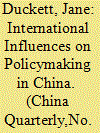

|
|
|
|
|
| Summary/Abstract |
Previous research has credited China's top leaders, Hu Jintao and Wen Jiabao, with the social policies of their decade in power, arguing that they promoted these policies either for factional reasons or to achieve rational, problem-solving goals. But such arguments ignore the dominant “fragmented authoritarian” model of policymaking in China that centres on bargaining among bureaucratic agencies. This article asks whether top leadership factions, rational problem solving, or “fragmented authoritarianism” can explain the adoption of one of the Hu and Wen administration's flagship policies, New Rural Cooperative Medical Schemes. Based on a careful tracing of this policy's evolution, it finds little evidence for these explanations, and instead uncovers the role played by international events and organizations, and ideas they introduced or sustained within policy networks. The article highlights some of the effects that China's international engagement has had on policymaking and the need to go beyond explanations of the policy process that focus solely on domestic actors. It proposes a new model of policymaking, “network authoritarianism,” that centres on policy networks spanning the domestic–international, state–non-state, and central–local divides, and which takes account of the influence of ideas circulating within these networks.
|
|
|
|
|
|
|
|
|
|
|
|
|
|
|
|
| 4 |
ID:
164416


|
|
|
|
|
| Summary/Abstract |
More so than for other countries, the management of China's water resources is an important aspect of its policy and politics, yet existing scholarly attempts to understand this importance are scattered among a wide range of sub-literatures that lack a unifying theoretical framework. This article attempts to identify common themes and features of the relationship between water, politics and governance in contemporary China by examining how this relationship has unfolded in historical perspective. It identifies three basic objectives that have shaped the politics and governance of China's water resources over time: legitimacy, economic development and environmental sustainability. These objectives map, though imperfectly, onto different periods in the history of the People's Republic of China, thereby highlighting how they have evolved. Together, these objectives explain policies towards, and the politics of, water resources in contemporary China. This understanding shows that water both shapes and reflects Chinese politics, and highlights the need for a theoretically coherent sub-literature on Chinese water policy and politics.
|
|
|
|
|
|
|
|
|
|
|
|
|
|
|
|
| 5 |
ID:
164412
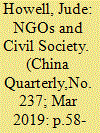

|
|
|
|
|
| Summary/Abstract |
Since 2015 rights-based NGOs, lawyers, feminists and journalists have endured the most stringent crackdown since 1989. Simultaneously the Xi Li administration has pushed forward a series of laws, policies and regulatory changes to enable service-oriented NGOs to apply for government contracts to provide welfare services. This seemingly Janus-like policy of welfarist incorporation can be traced back to the Hu–Wen period, often described as a lacklustre period, despite significant efforts to tackle issues of poverty and inequality. This article argues for a more balanced appraisal of this period by exploring in depth the complex politics underpinning efforts to pluralize welfare provision by involving service-oriented NGOs. It explores three sets of politics influencing this policy process: inter-institutional politics; state/non-state actor politics; and domestic/external politics. Furthermore, it considers processes of gradual institutional change adopted by key political actors to achieve these ends.
|
|
|
|
|
|
|
|
|
|
|
|
|
|
|
|
| 6 |
ID:
164411
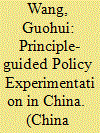

|
|
|
|
|
| Summary/Abstract |
The abolition of Agricultural Tax in 2005 was a major policy of the early Hu–Wen administration. But how and why did it happen? Drawing on abundant media reports, archive documents and internal speeches by key policymakers, as well as on the author's interviews, this article argues that this reform was pushed through (the “how”) by “principle-guided policy experimentation” with origins in the period of Jiang Zemin's leadership. Not only does this show policy continuities from the Jiang–Zhu era into the Hu–Wen period, it also reveals a different process of policy experimentation from that identified by Sebastian Heilmann in the economic policy arena. Under principle-guided policy experimentation, Chinese central decision makers first reached consensus on the principle of the Rural Tax and Fee Reform (RTFR) drawing on policy learning from prior bottom-up local experimentation, and then formulated and implemented an experimental programme from the top-down, funding it in order to encourage local governments to participate. The evidence suggests that international, political (rural instability), economic and fiscal considerations came to explain leaders’ decisions (the “why”) on tax reform as much as their individual preferences.
|
|
|
|
|
|
|
|
|
|
|
|
|
|
|
|
| 7 |
ID:
164414


|
|
|
|
|
| Summary/Abstract |
China's healthcare system is governed by institutions that are mutually incompatible. Although healthcare providers are supposed to offer affordable curative care services and engage in public health and administrative work, they receive insufficient financial support from the state and rely on generating informal profits and grey income. The “institutional misfit” between this public welfare mandate and medical service providers’ market orientation is particularly pronounced in the case of township health centres (THCs), a generalist type of healthcare provider with a key role in China's healthcare system. Based on fieldwork in four county-level jurisdictions, this study explores how local governments and THCs interact to cope with institutional misfit. It sheds light on a large variety of informal practices pertaining to human resources, healthcare services, drug procurement, health insurance and capital investment. Local governments deliberately neglect regulatory enforcement and collude with THCs to generate informal profits, behaviour which undermines service quality and increases healthcare costs. The study also shows that while the New Healthcare Reform altered the informal and collusive practices, it has failed to harmonize the underlying institutional misfit. To date, we see only a reconfiguration rather than an abandoning of informal practices resulting from recent healthcare reforms.
|
|
|
|
|
|
|
|
|
|
|
|
|
|
|
|
| 8 |
ID:
164409
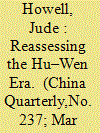

|
|
|
|
|
| Summary/Abstract |
The Hu–Wen era has been characterized as a “lost decade” for economic and political reform, but a “golden era” in terms of economic growth and political stability. Yet, relatively little attention has been paid to the social policies introduced during Hu and Wen's decade in power. These important policies, however, abolished agricultural taxes, extended health insurance, pensions and income support to almost all rural as well as urban residents, and built a civic welfare infrastructure to address migrants’ grievances. These policies, some of which were developed under the preceding Jiang Zemin and Zhu Rongji leadership, were introduced for a complex mix of reasons. Their aim was not only to reduce inequalities but also to stimulate domestic consumption and sustain economic growth, offset the effects of China's entry to the WTO and the global recession of 2008, and maintain social stability. They were the product of domestic bureaucratic politics and experimentation. They were also strongly influenced by China's integration into the international economy, as well as by international governmental and non-governmental organizations and the ideas they introduced into China's domestic policy networks. Although Hu–Wen era social policy reforms had only limited effects on reducing income inequality and involved complex politics, they did establish for the first time entitlements to social security and safety nets for all China's population.
|
|
|
|
|
|
|
|
|
|
|
|
|
|
|
|
| 9 |
ID:
164413
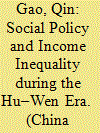

|
|
|
|
|
| Summary/Abstract |
The Hu–Wen era saw significant expansions in social policies in China. How did these policy changes affect income inequality, and did they leave a progressive legacy? Using the China Household income Project (CHIP) 2002, 2007 and 2013 data, this article offers empirical evidence to answer these questions. We find that these social policy changes indeed led to some convergence of the divided urban–rural–migrant social welfare systems and helped curtail the growing income inequality driven by market forces. Measured as the share in household final income, the size of urban social benefits decreased, while those for rural residents and rural-to-urban migrants increased from 2002 to 2013. Social benefits – especially pensions – reduced income inequality in all three groups, although to a much smaller extent for rural residents and migrants as compared to their urban peers. Rural residents also gained from agricultural and livelihood subsidies through the “Building a new socialist countryside” initiative.
|
|
|
|
|
|
|
|
|
|
|
|
|
|
|
|
| 10 |
ID:
164417
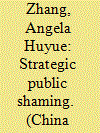

|
|
|
|
|
| Summary/Abstract |
This article examines strategic public shaming, a novel form of regulatory tactics employed by the National Development and Reform Commission (NDRC) during its enforcement of the Anti-Monopoly Law. Based on analysis of media coverage and interview findings, the study finds that the way that the NDRC disclosed its investigation is highly strategic depending on the firm's co-operative attitude towards the investigation. Event studies further show that the NDRC's proactive disclosure resulted in significantly negative abnormal returns of the stock prices of the firm subject to the disclosure. For instance, Biostime, an infant-formula manufacturer investigated in 2013, experienced −22 per cent cumulative abnormal return in a three-day event window, resulting in a loss of market capitalization that is 27 times the antitrust fine that it ultimately received. The NDRC's strategic public shaming might therefore result in severe market sanctions that deter firms from defying the agency.
|
|
|
|
|
|
|
|
|
|
|
|
|
|
|
|
| 11 |
ID:
164420
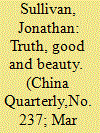

|
|
|
|
|
| Summary/Abstract |
A visit to a Chinese city of any size – looking up at downtown billboards, riding public transport, shopping at a mall – is to be in the presence of a Chinese celebrity endorsing a product, lifestyle or other symbols of “the good life.” Celebrity in China is big business, feeding off and nourishing the advertising-led business model that underpins the commercialized media system and internet. It is also a powerful instrument in the party-state's discursive and symbolic repertoire, used to promote regime goals and solidify new governmentalities through signalling accepted modes of behaviour for mass emulation. The multi-dimensional celebrity persona, and the public interest it stimulates in off-stage lives, requires an academic focus on the workings of celebrity separate to the products that celebrities create in their professional roles. The potential to connect with large numbers of ordinary people, and the emergence of an informal celebrity-making scene in cyberspace symptomatic of changing attitudes towards fame among Chinese people, marks the special status of celebrity within China's constrained socio-political ecology. The motivation for this article is to further scholarly understanding of how celebrity operates in China and to bring this expression of popular culture into the broader conversation about contemporary Chinese politics and society.
|
|
|
|
|
|
|
|
|
|
|
|
|
|
|
|
| 12 |
ID:
164415


|
|
|
|
|
| Summary/Abstract |
As urbanization continues to fuel land and property conflicts in rural China, shareholding has been promoted as a reform in property rights that would enhance bottom-up control in the governance of collective assets. The recent proliferation of community-based shareholding companies has been credited for giving villagers new identities as shareholders, which entitle them to vote, receive their share of collective profits, and elect the managers of their wealth. This paper critically appraises these reforms and offers a contrarian perspective to singular narratives of villager empowerment. While shareholding clarifies villagers’ rights of control, income and transfer in collective property, the effective exercise of such powers is often forestalled on the ground by the concentration of power in elite hands. To the extent that formal and informal constraints on cadre power remain tenuous, shareholding could function as a vehicle for the powerful to appropriate collective wealth rather than as a weapon of the weak.
|
|
|
|
|
|
|
|
|
|
|
|
|
|
|
|
|
|
|
|
|